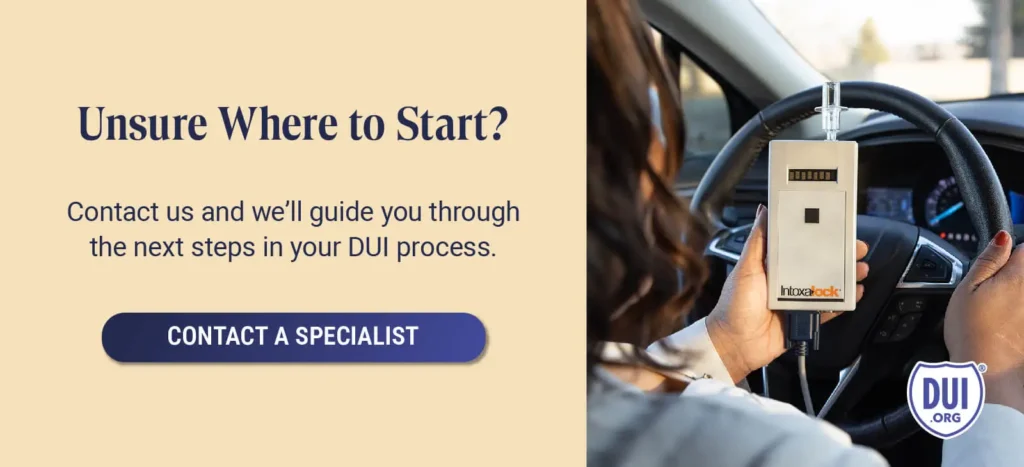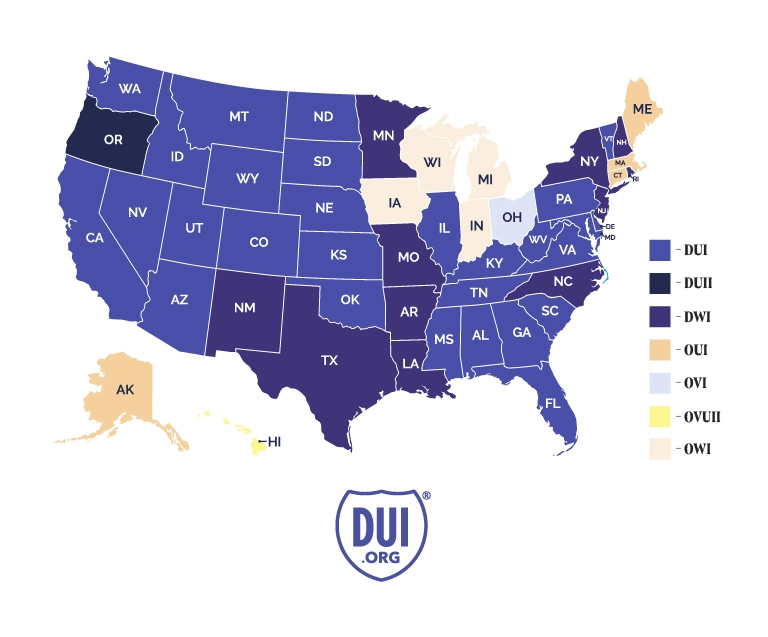
If you’ve ever heard terms like DUI, OUI and others, you might wonder what they mean and how they differ. Our guide simplifies it for you.
Getting a DUI is tough enough without having to learn a whole other language. But that’s exactly what it can feel like from the moment you’re pulled over. You may not understand what the police and your lawyer are telling you. And we’ve not even touched on how complex state law language is.
In this blog, you’ll learn commonly used DUI abbreviations, decode the meanings behind them, and understand how they impact impaired driving offenses by state. By the end, you’ll know exactly what these DUI abbreviations mean and how they apply to impaired driving laws, so you’ll be prepared if you’re navigating a DUI charge or simply want to stay informed about the laws in your state.
Decoding DUI Abbreviations: What Do They Mean?
If you’ve ever heard terms like DUI, DWI, OVI, or OWI and others, you might wonder what they mean and how they differ. These DUI abbreviations are used across the United States to describe impaired driving offenses, but the exact definitions and penalties vary depending on where you live.
States use different terms like DUI, DWI, and OVI for impaired driving offenses because each state has the authority to define and enforce its own laws. This variation stems from differences in legal terminology, enforcement priorities, and historical changes in how states address impaired driving.
While the difference between DUI and DWI can be confusing, terms like OVI and OWI add another layer of complexity. These variations reflect each state’s unique approach to addressing impaired driving and protecting public safety. If you’re unsure which laws apply in your state, consult with a DUI attorney or visit DUI.org for more information.
What Does DUI Stand For?
DUI stands for Driving Under the Influence. It’s one of the most common terms used to describe impaired driving and typically refers to operating a vehicle while under the influence of alcohol or drugs. In most states, a DUI charge can be issued if your blood alcohol concentration (BAC) is 0.08% or higher, though some states have stricter limits for certain drivers, like those under 21.
Interesting fact: Oregon’s drunk driving law is called DUII – Driving Under the Influence of Intoxicants.
What Does DWI Mean?
DWI stands for Driving While Intoxicated or Driving While Impaired, depending on the state. Like DUI, it refers to driving under the influence of alcohol or drugs. In some places, DWI is considered a more serious offense than DUI, especially if it involves a higher BAC or drug-related impairment.
What Is the Difference Between DUI and DWI?
The difference between DUI and DWI depends on state laws. In some states, they are interchangeable terms that both describe impaired driving. In others, DWI may refer specifically to driving while intoxicated by alcohol, while DUI covers impairment by both alcohol and drugs.
For example:
- In Texas, DWI is used for alcohol-related offenses, while DUI applies to minors with any detectable amount of alcohol.
- In New York, both terms are used but have different legal thresholds for BAC levels.
Zero-tolerance laws exist in all 50 states and Washington, D.C., making it illegal for drivers under 21 to operate a vehicle with even a small amount of alcohol in their system. While most states set the BAC limit at 0.02%, some have even stricter thresholds of 0.01% or 0.00%. These DUI zero-tolerance laws aim to discourage young drivers from drinking and driving, recognizing the increased risks they face on the road.
Interesting fact: Rhode Island uses both DUI and DWI. The choice of term depends on the age of the driver.
What Does OVI Stand For?
OVI stands for Operating a Vehicle Impaired and is primarily used in Ohio. This term covers impairment by both alcohol and drugs and doesn’t require that the vehicle be moving at the time of arrest; simply operating any part of the vehicle while impaired can result in an OVI charge.
What Does OWI Mean?
OWI stands for Operating While Intoxicated and is used in states like Indiana and Michigan. Similar to OVI, OWI focuses on operating a vehicle while impaired by alcohol or drugs. It emphasizes “operating” rather than “driving,” meaning you can be charged even if the vehicle isn’t actively moving.
What is OUI?
Maine and Massachusetts use OUI (Operating Under the Influence) to denote impaired driving due to alcohol or drugs. It broadens the scope beyond just driving, encompassing any operation of a vehicle while under the influence. Unlike drunk driving abbreviations like DUI or DWI, which specifically refer to driving, OUI extends its reach to any operation of a vehicle. This includes scenarios where you may be in physical control of a vehicle even if it's not in motion.

Are DUI, DWI, OVI, OWI, and OUI the Same Offense?
While all these DUI abbreviations describe impaired driving offenses, they are not the same. Each drunk driving acronym reflects slight differences in how states define and prosecute impaired driving:
- DUI is the most widely used term across the U.S.
- DWI is often associated with more severe intoxication levels.
- OVI, OWI, OUI emphasize vehicle operation rather than movement.
Despite these distinctions, all five DUI acronyms represent illegal actions that carry serious consequences.
Which States Use DUI vs. DWI vs. OVI vs. OWI?
Different states use different terms for impaired driving offenses:
- DUI: Most states use DUI as their primary term for impaired driving offenses.
- DWI: States like Texas and New York use DWI alongside or instead of DUI.
- OVI: Ohio exclusively uses OVI for impaired driving charges.
- OWI: States like Michigan and Indiana prefer OWI.
- OUI: Massachusetts and Maine commonly use OUI.
It’s important to know which term your state uses because it can affect how laws are applied and penalties are enforced.

| State | Abbreviation | Meaning |
|---|---|---|
| Alabama | DUI | Driving Under the Influence |
| Alaska | OUI | Operating Under the Influence |
| Arizona | DUI | Driving Under the Influence |
| Arkansas | DUI DWI | Driving Under the Influence Driving While Impaired |
| California | DUI | Driving Under the Influence |
| Colorado | DUI | Driving Under the Influence |
| Connecticut | DUI DWI OUI | Driving Under the Influence Driving While Impaired Operating Under the Influence |
| Delaware | DUI | Driving Under the Influence |
| Florida | DUI | Driving Under the Influence |
| Georgia | DUI | Driving Under the Influence |
| Hawaii | OVUII | Operating a Vehicle Under the Influence of an Intoxicant |
| Idaho | DUI | Driving Under the Influence |
| Illinois | DUI | Driving Under the Influence |
| Indiana | OWI | Operating While Impaired |
| Iowa | OWI | Operating While Impaired |
| Kansas | DUI | Driving Under the Influence |
| Kentucky | DUI | Driving Under the Influence |
| Louisiana | DWI | Driving While Impaired |
| Maine | OUI | Operating Under the Influence |
| Maryland | DUI | Driving Under the Influence |
| Massachusetts | OUI | Operating Under the Influence |
| Michigan | OWI | Operating While Impaired |
| Minnesota | DWI | Driving While Impaired |
| Mississippi | DUI | Driving Under the Influence |
| Missouri | DWI | Driving While Impaired |
| Montana | DUI | Driving Under the Influence |
| Nebraska | DUI | Driving Under the Influence |
| Nevada | DUI | Driving Under the Influence |
| New Hampshire | DWI | Driving While Impaired |
| New Jersey | DWI | Driving While Impaired |
| New Mexico | DWI | Driving While Impaired |
| New York | DWAI | Driving While Ability Impaired |
| North Carolina | DWI | Driving While Impaired |
| North Dakota | DUI | Driving Under the Influence |
| Ohio | OVI | Operating a Vehicle Impaired |
| Oklahoma | DUI | Driving Under the Influence |
| Oregon | DUII | Driving Under the Influence of Intoxicants |
| Pennsylvania | DUI | Driving Under the Influence |
| Rhode Island | DUI DWI | Driving Under the Influence Driving While Impaired |
| South Carolina | DUI | Driving Under the Influence |
| South Dakota | DUI | Driving Under the Influence |
| Tennessee | DUI | Driving Under the Influence |
| Texas | DWI | Driving While Impaired |
| Utah | DUI | Driving Under the Influence |
| Vermont | DUI | Driving Under the Influence |
| Virginia | DUI | Driving Under the Influence |
| Washington | DUI | Driving Under the Influence |
| West Virginia | DUI | Driving Under the Influence |
| Wisconsin | OWI | Operating While Impaired |
| Wyoming | DUI | Driving Under the Influence |
Do All States Penalize DUI and DWI the Same Way?
Penalties for drunk driving vary by state as well. An increasingly common measure is the installation of an ignition interlock device (IID), which requires you to perform a breath test before starting the vehicle, ensuring you are not under the influence of alcohol. If you're facing a drunk driving charge, considering an ignition interlock device might be a proactive step towards regaining your driving privileges and complying with your state's legal requirements.
How Can I Find Out What DUI Abbreviations My State Uses?
To learn about your state’s specific laws for impaired driving:
- Visit DUI.org for resources tailored to your location.
- Check your state’s Department of Motor Vehicles (DMV) website for detailed information on penalties.
- Consult with a local attorney who specializes in DUI cases. They can provide personalized advice based on your situation.
Knowing your state’s laws can help you navigate charges more effectively and understand potential consequences.
FAQs About DUI Acronyms
What does BAC mean in relation to DUI laws?
BAC stands for Blood Alcohol Concentration, the percentage of alcohol in your bloodstream. A BAC of 0.08% or higher is illegal in most states (Utah is 0.05%).
Is there a difference between “driving” and “operating” in these acronyms?
Yes! Terms like OVI and OWI focus on operating any part of a vehicle while impaired, even if it isn’t moving.
Which DUI acronym is most used nationwide?
DUI is the most widely recognized term across the United States.
Can I be charged with an OVI or OWI without moving my car?
Yes! If you’re found impaired while operating parts of your vehicle (like turning on the ignition), you can be charged under OVI, OWI, or OUI laws.
Helping the DUI Journey Make Sense
Understanding these DUI acronyms can help you make sense of impaired driving laws across the country. Whether it’s DUI in California or OWI in Wisconsin, knowing what these terms mean ensures you stay informed about safe driving practices and legal consequences.
Explore more helpful resources on DUI.org.
This blog is for informational purposes only. It is not legal advice. Consult an experienced DUI attorney for additional support.
Get support.
What is next? We can help you through the process. Give us a little information and we can support you through the next steps.
All fields are required.